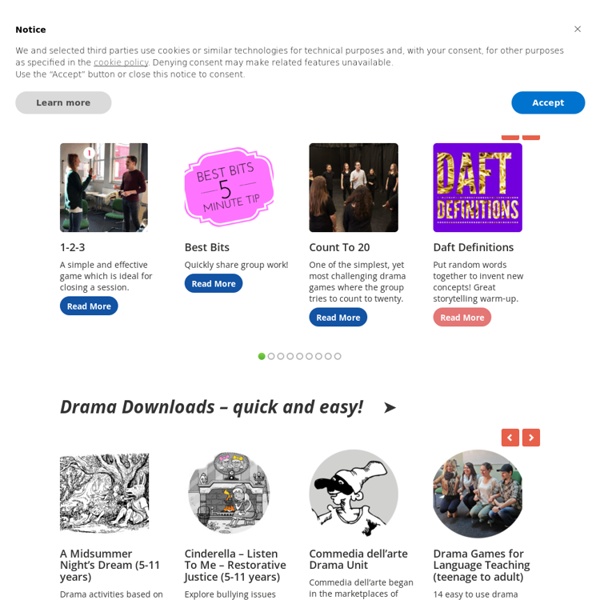



DRAMA in ENGLISH LANGUAGE TEACHING: A WHOLE-PERSON LEARNING APPROACH Introduction What is Drama in ELT? Most ELT teachers nowadays advocate some elements of a ‘Communicative Approach’ and therefore recognise and appreciate the value of Drama in ELT. Drama can be defined as activity involving people in a social context and there is no doubt that effective communication in social situations involves other forms of communication that go beyond language competence and includes the use of gesture, body posture, intonation and other prosodic features.
Green Screen - Jennifer L. Wagner We painted an entire wall in our LAB green and we added a green picture window option as well. ANOTHER IDEA-- we have just started smashing the app Tellagami w/ DOINK. The Hub - ICEBREAKERS to help participants get to know each other and better engage in an activity - Orthodox Church in America By Nicholas Finley When holding a retreat, conference, or any gathering it is important for everyone to stretch their social muscles in order to engage in the event with the proper positive attitude about the activity. "Ice-breakers" and similar activities are some of the best ways to help everyone loosen up a bit while helping participants get to know each other. These types of activities are always a bit awkward and perceived as somewhat "lame."
August 2016 If you follow me on Instagram, you may have seen pictures of my new theme for this year...Reading Ninjas! I had some requests for more pictures of my decor, so here you go! I used our poster printer at school to make the signs in my Reading Ninja Library/Media Center pack larger. I also used the poster printer to enlarge some of Krista Wallden's clipart to make the sign above the door. I love how it turned out.
Top SOS for Teaching Students To Cite Evidence Welcome to our special SOS Top Ten series. In this edition, we highlight some of the most popular ways to use Spotlight on Strategies (CDN Version) to teach and model how to cite evidence. Backing up what they think they know with factual information is an important skill for students to practice and master. Simply stating a claim isn’t enough. When we ask students to not only give us an answer, but also to prove it, we ask them to make connections and understand at a deeper level.
Drama in Education (*This article appeared in the Youth Theatre Journal, 9, 92-96, March, 1995) (Re-published on website, August 2, 2002) "Mental hygiene" refers to approaches to preventive psychiatry through the development of habits of self-care. Translated into psychological terms, this means learning not just information, but more importantly, skills of interpersonal problem solving, communications and self-awareness. Active practice is necessary in order to acquire the many component skills in these three categories, and that means that an experiential form of education such as role playing or sociodramatic simulations is needed. (See also paper on Role Playing in Education on this Website.) Drama offers a rich range of activities which can be applied in the service of developing spontaneity and a broader role repertoire.
About Mrs. Hanneken Mrs. Hanneken's Biography Click Above to view my blog Mrs. Hanneken holds both a Bachelor's and Master's in Library Science from Kutztown University. For the first eight years of her career, she worked as an elementary librarian at Bristol Borough School District in Bristol, Pennsylvania. Process Drama in Education Webpage Supplement to Chapter 9: Gustave J. Weltsek-Medina Slightly Revised, June 6, 2008 The book chapter presents a general overview of this complex subject. The Compassionate Maker Gina Seymour runs a MakerCare program at Islip High School dedicated to nurturing philanthropic qualities while benefitting organizations both local and global. Collaborating with service based clubs in her school and cultivating partnerships with outside agencies, students carry out hands-on service projects taking an active role in making a difference in their community and the world. Maker activities for children foster valuable learning opportunities among our students.
Why Teach Drama? If you are like me, you frequently find yourself trying to justify your existence as a Drama teacher. Teachers and parents often don't really understand what a classroom Drama teacher does, and they can question the importance of Drama class-especially since most classroom teachers feel pressured to get through a given curriculum in a given time, and Drama class necessarily shortens the classroom teacher's contact time. Those of us who work in Drama with and for Young People know instinctively that it is important, but we are not always easily able to communicate this understanding. Below is an essay I wrote in response to concerns in my school about the adding of Drama classes to the regular schedule.